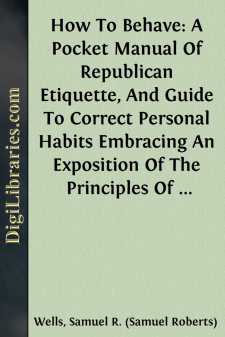Categories
- Antiques & Collectibles 13
- Architecture 36
- Art 48
- Bibles 22
- Biography & Autobiography 813
- Body, Mind & Spirit 142
- Business & Economics 28
- Children's Books 15
- Children's Fiction 12
- Computers 4
- Cooking 94
- Crafts & Hobbies 4
- Drama 346
- Education 46
- Family & Relationships 57
- Fiction 11828
- Games 19
- Gardening 17
- Health & Fitness 34
- History 1377
- House & Home 1
- Humor 147
- Juvenile Fiction 1873
- Juvenile Nonfiction 202
- Language Arts & Disciplines 88
- Law 16
- Literary Collections 686
- Literary Criticism 179
- Mathematics 13
- Medical 41
- Music 40
- Nature 179
- Non-Classifiable 1768
- Performing Arts 7
- Periodicals 1453
- Philosophy 64
- Photography 2
- Poetry 896
- Political Science 203
- Psychology 42
- Reference 154
- Religion 513
- Science 126
- Self-Help 84
- Social Science 81
- Sports & Recreation 34
- Study Aids 3
- Technology & Engineering 59
- Transportation 23
- Travel 463
- True Crime 29
The Book of Business Etiquette
Description:
Excerpt
THE AMERICAN BUSINESS MAN
The business man is the national hero of America, as native to the soil and as typical of the country as baseball or Broadway or big advertising. He is an interesting figure, picturesque and not unlovable, not so dashing perhaps as a knight in armor or a soldier in uniform, but he is not without the noble (and ignoble) qualities which have characterized the tribe of man since the world began. America, in common with other countries, has had distinguished statesmen and soldiers, authors and artists—and they have not all gone to their graves unhonored and unsung—but the hero story which belongs to her and to no one else is the story of the business man.
Nearly always it has had its beginning in humble surroundings, with a little boy born in a log cabin in the woods, in a wretched shanty at the edge of a field, in a crowded tenement section or in the slums of a foreign city, who studied and worked by daylight and firelight while he made his living blacking boots or selling papers until he found the trail by which he could climb to what we are pleased to call success. Measured by the standards of Greece and Rome or the Middle Ages, when practically the only form of achievement worth mentioning was fighting to kill, his career has not been a romantic one. It has had to do not with dragons and banners and trumpets, but with stockyards and oil fields, with railroads, sewer systems, heat, light, and water plants, telephones, cotton, corn, ten-cent stores and—we might as well make a clean breast of it—chewing gum.
We have no desire to crown the business man with a halo, though judging from their magazines and from the stories which they write of their own lives, they are almost without spot or blemish. Most of them seem not even to have had faults to overcome. They were born perfect. Now the truth is that the methods of accomplishment which the American business man has used have not always been above reproach and still are not. At the same time it would not be hard to prove that he—and here we are speaking of the average—with all his faults and failings (and they are many), with all his virtues (and he is not without them), is superior in character to the business men of other times in other countries. This without boasting. It would be a great pity if he were not.
Without trying to settle the question as to whether he is good or bad (and he really can be pigeon-holed no better than any one else) we have to accept this: He is the biggest factor in the American commonwealth to-day. It follows then, naturally, that what he thinks and feels will color and probably dominate the ideas and the ideals of the rest of the country. Numbers of our magazines—and they are as good an index as we have to the feeling of the general public—are given over completely to the service or the entertainment of business men (the T. B. M.) and an astonishing amount of space is devoted to them in most of the others.
It may be, and as a matter of fact constantly is, debated whether all this is good for the country or not....












